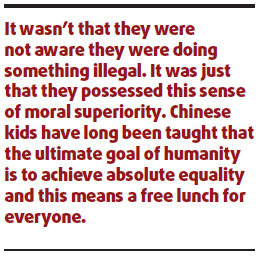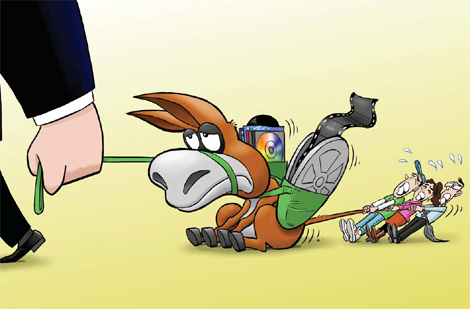Raymond Zhou
Digital Robin Hoods?
By Raymond Zhou (China Daily)
Updated: 2009-12-18 07:40
 |
Large Medium Small |
|
|

The clampdown on file-sharing websites has made life easier for some legal operators, but puts the street hawkers of DVDs back in business...
"Who's hurt most by online movie piracy?" I was asked this question while touring southern China early this year. Intuitively, it would seem to be the legal owners of the movies pirated, but it's more complex than that. As I was dithering, the guy who put me in the quandary laughed: "The correct answer is, the offline movie pirates - the disc makers."
Ever since the Internet revolution entered phase two, counterfeiters have been feeling the pinch. People uploaded movies and television shows online in a feel-good spirit of sharing. They didn't care about making money, they just wanted to spread the joy. Profits be damned, as well as copyright issues.
It wasn't that they were not aware they were doing something illegal. It was just that they possessed this sense of moral superiority. Chinese kids have long been taught that the ultimate goal of humanity is to achieve absolute equality and this means a free lunch for everyone.
The West does not have this interpretation of communism, but when it comes to the sharing of copyrighted materials many seem to regard the law as an inconvenience that hinders technological and human progress. When the United States cracked down on the practice by issuing summonses on heavy-duty downloaders, the press did not hide its sympathy. It portrayed the entertainment businesses as a big bad wolf and the individual violators as simple people who meant no harm. For instance, there was the 85-year-old lady who downloaded without knowing what she was doing.
Here in China many netizens have approached the practice with a similar mindset. The description used most often in the popular press is "illegal but reasonable". The recent shutdown of hundreds of BT websites has pitched the faction that deems it "illegal" against the "reasonable" camp.
The cat-and-mouse chase ends up in a meal for the cat - no surprise there. Sites like BTChina used to defend itself by saying it was just an index of links. If a search engine is not responsible for illegal materials, why should it be held accountable for the pirated content it links to?
The government's countermeasure is equally adroit: We did not crack down because you offer illegal video content, but because you are not licensed as a video site in the first place. BTChina did not say a word but close down. Its owner, Huang Xiwei, sounded so scared it is doubtful he will go near the business again.
Well, it was not exactly a business, more like a non-profit club. People have been supportive of the sites partly because they did not seem to have a profit motive. Who can blame them for stealing from the rich and giving it to the huddling masses?
But the digital Robin Hoods have been wreaking havoc on businesses whose core products can be digitized. The value of print publications has been dropping; the music business has suffered a mortal blow (in China disc distribution is almost non-existent and digital albums are mostly used as promotional tools for concerts and product endorsement deals); and now the movie and TV industries are putting up a good fight.
When I read views about this subject from the US, I'm often reminded of the Chinese revolution. "Progressive" types laugh at copyright owners who hold on to their property for dear life and refuse to give them away "for the good of humanity". They are portrayed as unimaginative, reactionary and diehard.

In China the pressure is not rhetorical but comes from the actions of a new bunch of "heroes". One of these groups is the translators who band together and render foreign-language dialogue into Chinese. They create subtitles of, say, the latest edition of Prison Break in just a couple of hours. The quality of their work is more reliable than the hack job provided by disc counterfeiters. Their selections accurately reflect the demand of these shows in the China market, most of which are not aired on Chinese TV.
In the end it is not just a moral vs legal fight. It has turned into a lifestyle issue. Browse Chinese Internet forums and the most common reaction toward the sudden wipeout is: "What can I do now? Do I have to go back to the dark ages of disc watching?" Even the few who support government action do not cite legal justification.
"BT downloading is hogging all the bandwidth," some complained. Even BT's competitors, such as legally operating video-sharing sites, are not gloating, or at least not openly. The atmosphere since the beginning of this month has been downright mournful - except for the unbelievably high approval ratings for the measure in official reports.
Pirating copyrighted content seems to be a clear-cut issue: It is illegal and should be banned. But in reality it is not that simple. For example, Hollywood is a victim of piracy. But some in China, especially industry insiders, hold the conspiracy theory that Hollywood is a perpetrator rather than a victim. They believe Hollywood has been deliberately supplying Chinese pirates with hard-to-obtain source materials.
Hard to believe? Their reasoning goes, Hollywood can only export a dozen movies to China, which has an import quota. So, the majority of its products do not have a China market in the first place. But it expects someday the quota system will be lifted. To warm up this future market, it needs to provide "samples" so that paying audiences of the future will become addicted. Pirates essentially save them the marketing costs.
I once asked a senior US official to comment on this and his eyes almost popped out. He had never heard of the argument. "But how can you explain the ready availability of all the new Hollywood blockbusters - some even before their debuts on the US screen? It has got to be an inside job," I continued to argue.
Actually, I can argue from either side, or several sides: I could take the populist approach and go with the majority. It would make me look like a columnist in touch with the people and new trends. I could support the government and sympathize with the entertainment industry by emphasizing the rule of law.
The clearout of BT sites will likely revitalize the offline piracy business, which, if you look around, employs tens of thousands of street vendors, a group trying to earn a meager living out of a sprinkling of stardust. Arguably it is much harder for the government to sweep them off the street - and the overpasses and underpasses in crowded shopping districts.
I used to stock thousands of discs, but one day I realized it was not feasible. It was a colossal waste of shelf space. So I turned to video-sharing sites, those with licenses and ample capital. I don't mind paying - as long as the fee is reasonable. For those accustomed to a free lunch, it could take a mindset change, but it's not unthinkable.
Until that day, we'll have to get used to the Kafkaesque sight of disc hawkers blocking the path to the movie theater, or online party-crashers clogging the information superhighway.










